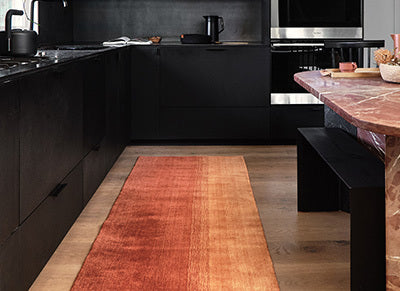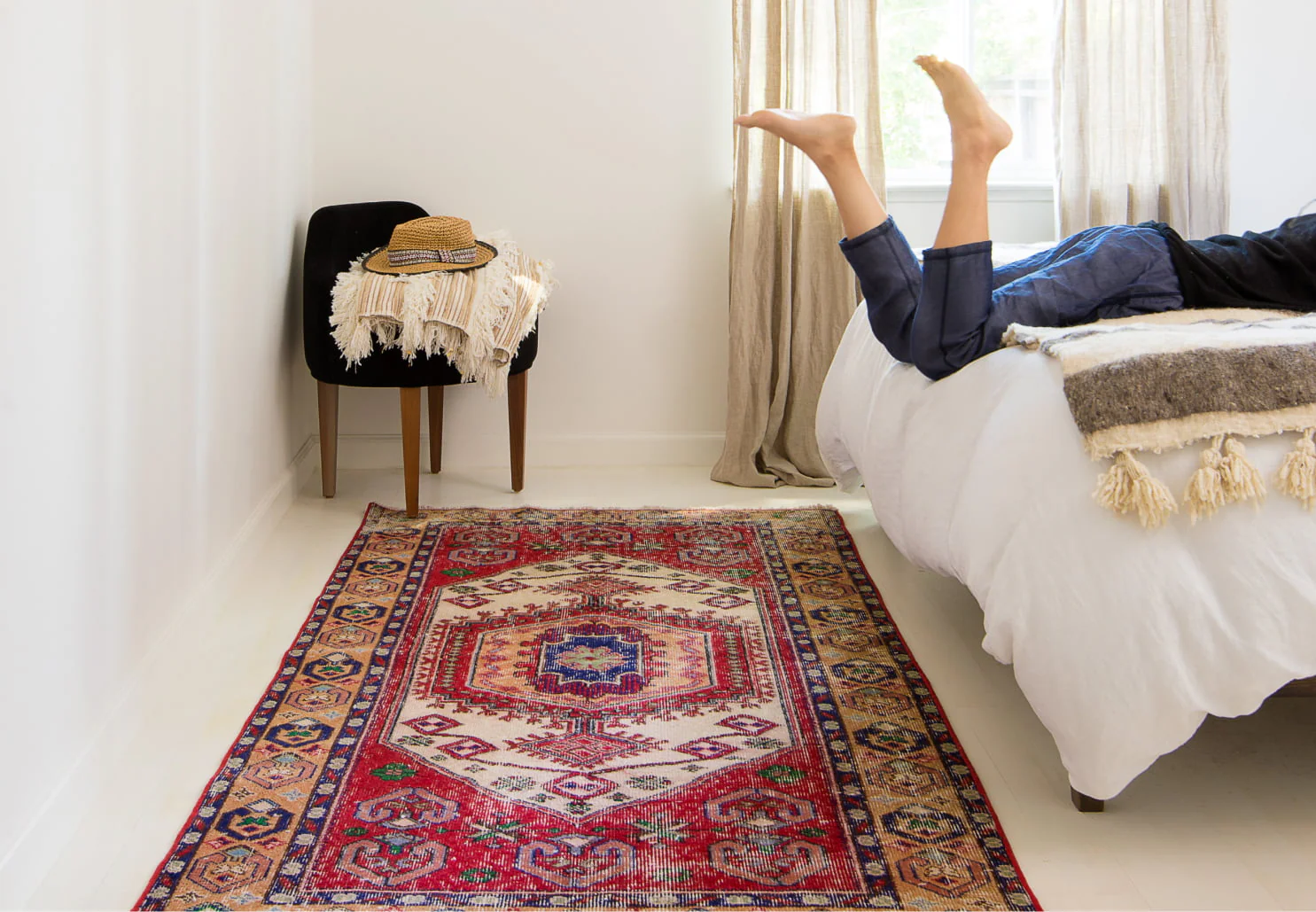


















Proudly handwoven and handknotted by skilled artisans using time-honored techniques in Bhadohi, India.
Dimensions: 8'3" x 11'6" (253 cm x 352 cm)
Handwoven in 2019 under Revival-Made, Revival's line of new and bespoke products. Natural inconsistencies are inherent in these unique, handcrafted rugs.
Rug Type:
-
Hand-knotted Rugs
Sturdy pile rugs meticulously woven by hand, with individually hand-tied knots, so no two are exactly alike
Age:
-
New
Recently woven and never used in a home
Main Color:
- Beige, Cream
- Handmade in small batches of less than four
- 100% wool pile on cotton foundation
- Dimensions: 8'3" x 11'6" (253 cm x 352 cm)
- Hand-knotted plush medium pile (approximately ½†thick)
- Color palette: cream, sandstone, blush beige, silvery gray, moss green, powder blue, salmon pink
- Classic and timeless Persian motifs feature intricate patterns and floral designs, all framed by a border
- A series of repeating medallions fill out the field in balanced, ornamental details
- Boteh flames (or sprouting seeds) stand for growth and regeneration—they’re known as the “Seed of Life†in Anatolia and the inspiration for India’s traditional paisley patterns
- The corners of the rug are heavily ornate
- Floral motifs are a staple in rug design—showing up in a variety of styles including natural, abstract, and geometric
- Artisanal and tribal, geometric designs feature angular edges and simple shapes—like diamonds, squares, lattices, and stylized animals
- A larger border is flanked by two smaller borders
Our partner is a small, family-run operation devoted to maintaining the integrity of the yarn they use. Wherever possible they prioritize the use of organic materials, and are committed to a high level of quality and craftsmanship.
Material DetailsSoft and textural wool secured to a durable cotton foundation, these hand-knotted rugs have a smooth, dense surface that make it a pleasure to glide across and a soft yet practical medium pile with the ideal amount of spring for toes to sink into. Thanks to their strength, beauty, and the amount of time it took to create them, hand-knotted rugs often have a long lifespan—families pass them on from each generation to the next.
- We recommend that you regularly vacuum your rug to remove dirt and grime. Depending on how heavily your rug is used, just once or twice a month is adequate. Too much vacuuming can wear down the knots and fibers more quickly. If you have a suction attachment on your vacuum cleaner, use that instead of a rotary vacuum.
- Every few months, you’ll also want to flip your rug over and vacuum the back to get the grit out of the foundation of the rug. It also helps to rotate your rug once a year to ensure even wear over time.
- Every 3-5 years, we recommend getting your rug professionally hand-washed. Please do not take it to get steam or dry cleaned—this will almost certainly damage the rug! Hand-washing requires the use of a pH-balanced shampoo, worked into the rug by hand with a soft-bristled brush, before being rinsed thoroughly. This process should be repeated a few times.
- In case of spills:
- If the spill is organic and non-oily (e.g., wine), use a paper towel or cloth to blot the liquid. Add some clean water sparingly to the spot to dilute the stain (or wet a paper towel or cloth) and blot. Repeat this process until the stain is removed.
- If the stain is persistent, resist the urge to scrub. Scrubbing can damage the wool fibers and more easily allow the stain to penetrate. You may try using a mild detergent, such as very diluted dishwashing soap, following the same blot-and-rinse procedure.
- If the spill is a denser, more oily liquid, try first to scoop what you can from the surface using a spoon or perhaps some heavier paper, and then do the blot-and-rinse. If the spill is significant, non-organic and/or composed of chemical substances, or the above methods don’t work, we suggest getting the rug professionally hand-washed as soon as possible.
- For rugs with deeply saturated color palettes, be sure to spot-clean them in an area that can be hosed down immediately after, as some color bleeding may occur.
Order A Sample
Benedicte - Rug Sample
Size 12" x 12"
Free shipping & return
Recently Viewed
Benedicte Hand-knotted Rug
![]() Free Shipping
Free Shipping
![]() Easy Returns
Easy Returns
Proudly handwoven and handknotted by skilled artisans using time-honored techniques in Bhadohi, India.
Dimensions: 8'3" x 11'6" (253 cm x 352 cm)
Handwoven in 2019 under Revival-Made, Revival's line of new and bespoke products. Natural inconsistencies are inherent in these unique, handcrafted rugs.
- Handmade in small batches of less than four
- 100% wool pile on cotton foundation
- Dimensions: 8'3" x 11'6" (253 cm x 352 cm)
- Hand-knotted plush medium pile (approximately ½†thick)
- Color palette: cream, sandstone, blush beige, silvery gray, moss green, powder blue, salmon pink
- Classic and timeless Persian motifs feature intricate patterns and floral designs, all framed by a border
- A series of repeating medallions fill out the field in balanced, ornamental details
- Boteh flames (or sprouting seeds) stand for growth and regeneration—they’re known as the “Seed of Life†in Anatolia and the inspiration for India’s traditional paisley patterns
- The corners of the rug are heavily ornate
- Floral motifs are a staple in rug design—showing up in a variety of styles including natural, abstract, and geometric
- Artisanal and tribal, geometric designs feature angular edges and simple shapes—like diamonds, squares, lattices, and stylized animals
- A larger border is flanked by two smaller borders
Our partner is a small, family-run operation devoted to maintaining the integrity of the yarn they use. Wherever possible they prioritize the use of organic materials, and are committed to a high level of quality and craftsmanship.
Material DetailsSoft and textural wool secured to a durable cotton foundation, these hand-knotted rugs have a smooth, dense surface that make it a pleasure to glide across and a soft yet practical medium pile with the ideal amount of spring for toes to sink into. Thanks to their strength, beauty, and the amount of time it took to create them, hand-knotted rugs often have a long lifespan—families pass them on from each generation to the next.
- We recommend that you regularly vacuum your rug to remove dirt and grime. Depending on how heavily your rug is used, just once or twice a month is adequate. Too much vacuuming can wear down the knots and fibers more quickly. If you have a suction attachment on your vacuum cleaner, use that instead of a rotary vacuum.
- Every few months, you’ll also want to flip your rug over and vacuum the back to get the grit out of the foundation of the rug. It also helps to rotate your rug once a year to ensure even wear over time.
- Every 3-5 years, we recommend getting your rug professionally hand-washed. Please do not take it to get steam or dry cleaned—this will almost certainly damage the rug! Hand-washing requires the use of a pH-balanced shampoo, worked into the rug by hand with a soft-bristled brush, before being rinsed thoroughly. This process should be repeated a few times.
- In case of spills:
- If the spill is organic and non-oily (e.g., wine), use a paper towel or cloth to blot the liquid. Add some clean water sparingly to the spot to dilute the stain (or wet a paper towel or cloth) and blot. Repeat this process until the stain is removed.
- If the stain is persistent, resist the urge to scrub. Scrubbing can damage the wool fibers and more easily allow the stain to penetrate. You may try using a mild detergent, such as very diluted dishwashing soap, following the same blot-and-rinse procedure.
- If the spill is a denser, more oily liquid, try first to scoop what you can from the surface using a spoon or perhaps some heavier paper, and then do the blot-and-rinse. If the spill is significant, non-organic and/or composed of chemical substances, or the above methods don’t work, we suggest getting the rug professionally hand-washed as soon as possible.
- For rugs with deeply saturated color palettes, be sure to spot-clean them in an area that can be hosed down immediately after, as some color bleeding may occur.






